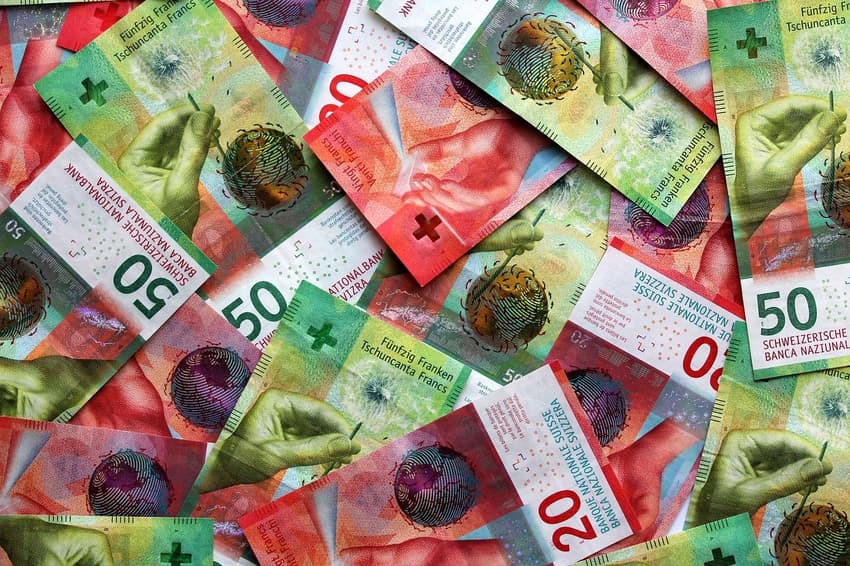How Covid, Ukraine and energy costs are changing Swiss spending habits

The war in Ukraine and the subsequent trade and financial sanctions against Russia are expected to have further repercussions on the budget of many households in Switzerland. This is how.
Beyond the political and humanitarian effects of the war, which are the most important considerations in any armed conflict, there are also far-reaching economic consequences for nations and individuals alike.
Switzerland’s households have already felt the impact of higher costs on certain essential goods, and more price hikes are predicted.
What did the Swiss spend most of their money on in the past years?
In 2020, the last year for which official data is available, a large portion of an average household’s total disposable income — 5,296 francs — was spent for the consumption of goods and services.
Consumer spending represented 52.4 percent of gross household income. Expenses for housing and energy were the biggest burden on the budget, at around 1,456 francs, or 14.4 percent of gross income.
Taxes took out 1,182 francs per month, or 11.7 percent of income.
Also part of compulsory expenditure were social insurance and pension fund contributions (10.2 percent of gross income) as well as health insurance premiums (6.5 percent).
Transport costs amounted to 7.4 percent, followed by food and non-alcoholic beverages (6.3 percent), restaurants (5.8 percent), and leisure and cultural activities (5.4 percent).
READ MORE: What do people in Switzerland spend their money on?
In terms of food and beverage, the highest single expense in Switzerland in 2020 was on meat — 1,383 francs a month.
The next highest single expense category (1,237 francs) were drinks, followed by dairy products (1,026 francs), while breads and cereals cost 840 francs.
In all, meat and eggs made up 35.6 percent of food expenses, while fruits and vegetables accounted for 13.7 percent.
READ MORE: Meat, cheese or booze: What do the Swiss spend the most money on
How will the war change these spending habits?
What we know so far is that at least two categories of consumer goods are getting more expensive and will likely continue to take a bigger chunk out of an average family’s monthly budget: energy (which includes electricity, fuel, and petrol), as well as certain food items.
This is why:
Russia is a major producer of oil and gas, though exactly how much of it is imported into Switzerland is not certain.
However, the prices of petroleum products in Switzerland rose by 6.1 percent after the invasion, according to a report by SRF public broadcaster.
Petrol prices have already exceeded more than 2 francs per litre in some cantons, and other energy-related costs are soaring as well, prompting the government to consider whether financial help might be necessary for low-income households.

Petrol prices in Switzerland are climbing. Photo by Erik Mclean on Pexels
Be it as it may, energy costs are now likely to take out an even bigger share of an average household’s expenditures.
In terms of food, budgets will take a hit as well, as Russia’s invasion of Ukraine drove up prices of raw materials, fuelling inflation and higher cost of consumer goods.
READ MORE: How Covid, inflation and the Ukraine invasion has made Switzerland more expensive
The reason is that Ukraine is commonly known as the breadbasket of Europe because 12 percent of the world’s wheat supply comes from the Eastern-European country. It is also among the largest exporters of corn.
The (relatively) good news is that only 3 percent of Switzerland’s wheat comes directly from Ukraine, with the rest sourced either locally or from the EU.
But while the reliance on these imports is not enormous, if the Ukrainian crisis continues, prices of bread and other wheat-based products are likely to climb. One problem could be availability and price of fertilisers used in agriculture, as natural gas from Russia is needed to manufacture them.
This means foods derived from agriculture are becoming more expensive as well, consuming, as it were, a bigger chunk of family budgets.
Comments
See Also
Beyond the political and humanitarian effects of the war, which are the most important considerations in any armed conflict, there are also far-reaching economic consequences for nations and individuals alike.
Switzerland’s households have already felt the impact of higher costs on certain essential goods, and more price hikes are predicted.
What did the Swiss spend most of their money on in the past years?
In 2020, the last year for which official data is available, a large portion of an average household’s total disposable income — 5,296 francs — was spent for the consumption of goods and services.
Consumer spending represented 52.4 percent of gross household income. Expenses for housing and energy were the biggest burden on the budget, at around 1,456 francs, or 14.4 percent of gross income.
Taxes took out 1,182 francs per month, or 11.7 percent of income.
Also part of compulsory expenditure were social insurance and pension fund contributions (10.2 percent of gross income) as well as health insurance premiums (6.5 percent).
Transport costs amounted to 7.4 percent, followed by food and non-alcoholic beverages (6.3 percent), restaurants (5.8 percent), and leisure and cultural activities (5.4 percent).
READ MORE: What do people in Switzerland spend their money on?
In terms of food and beverage, the highest single expense in Switzerland in 2020 was on meat — 1,383 francs a month.
The next highest single expense category (1,237 francs) were drinks, followed by dairy products (1,026 francs), while breads and cereals cost 840 francs.
In all, meat and eggs made up 35.6 percent of food expenses, while fruits and vegetables accounted for 13.7 percent.
READ MORE: Meat, cheese or booze: What do the Swiss spend the most money on
How will the war change these spending habits?
What we know so far is that at least two categories of consumer goods are getting more expensive and will likely continue to take a bigger chunk out of an average family’s monthly budget: energy (which includes electricity, fuel, and petrol), as well as certain food items.
This is why:
Russia is a major producer of oil and gas, though exactly how much of it is imported into Switzerland is not certain.
However, the prices of petroleum products in Switzerland rose by 6.1 percent after the invasion, according to a report by SRF public broadcaster.
Petrol prices have already exceeded more than 2 francs per litre in some cantons, and other energy-related costs are soaring as well, prompting the government to consider whether financial help might be necessary for low-income households.

Be it as it may, energy costs are now likely to take out an even bigger share of an average household’s expenditures.
In terms of food, budgets will take a hit as well, as Russia’s invasion of Ukraine drove up prices of raw materials, fuelling inflation and higher cost of consumer goods.
READ MORE: How Covid, inflation and the Ukraine invasion has made Switzerland more expensive
The reason is that Ukraine is commonly known as the breadbasket of Europe because 12 percent of the world’s wheat supply comes from the Eastern-European country. It is also among the largest exporters of corn.
The (relatively) good news is that only 3 percent of Switzerland’s wheat comes directly from Ukraine, with the rest sourced either locally or from the EU.
But while the reliance on these imports is not enormous, if the Ukrainian crisis continues, prices of bread and other wheat-based products are likely to climb. One problem could be availability and price of fertilisers used in agriculture, as natural gas from Russia is needed to manufacture them.
This means foods derived from agriculture are becoming more expensive as well, consuming, as it were, a bigger chunk of family budgets.
Join the conversation in our comments section below. Share your own views and experience and if you have a question or suggestion for our journalists then email us at [email protected].
Please keep comments civil, constructive and on topic – and make sure to read our terms of use before getting involved.
Please log in here to leave a comment.